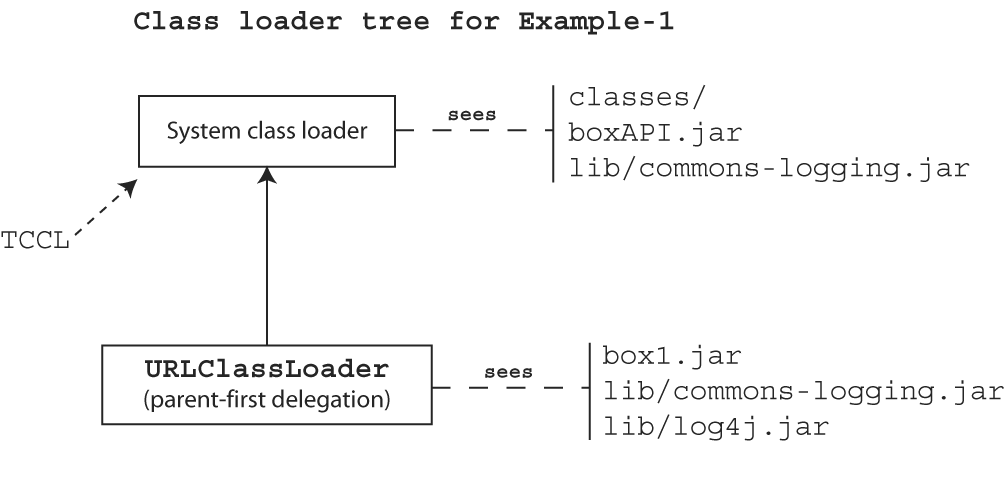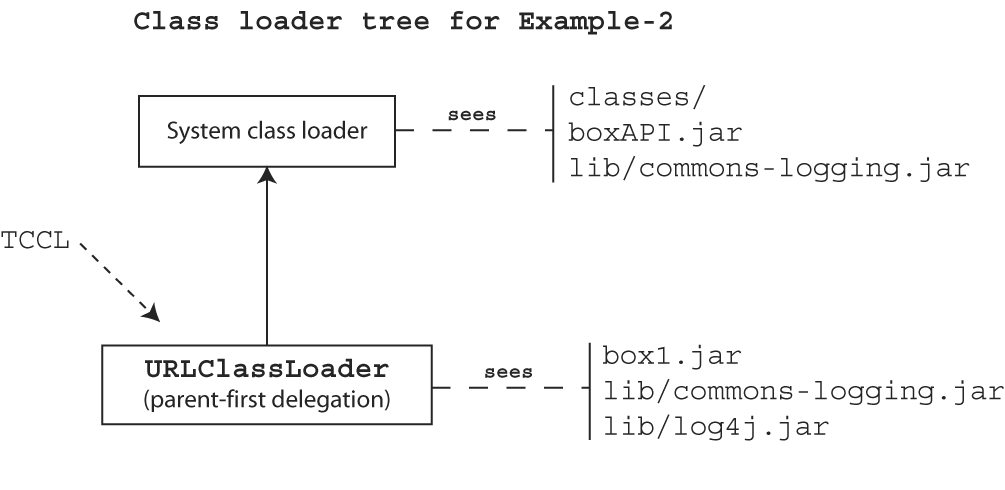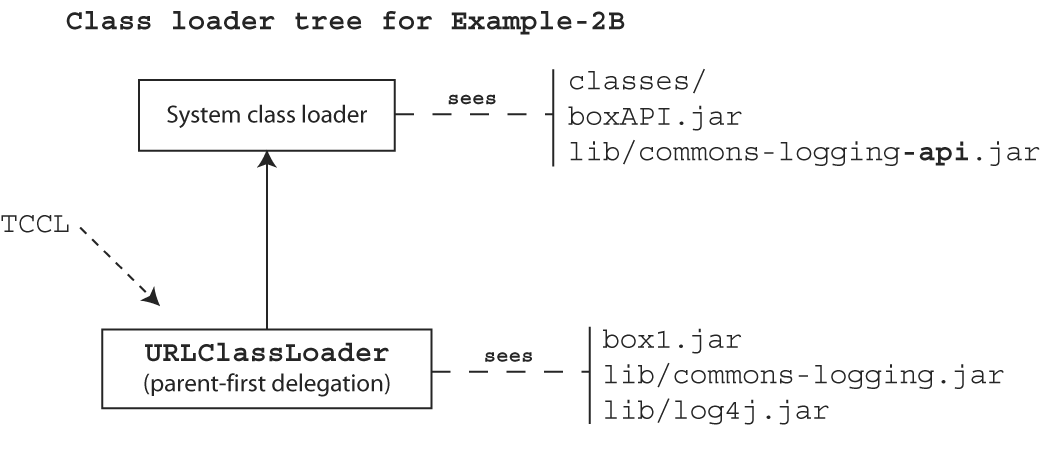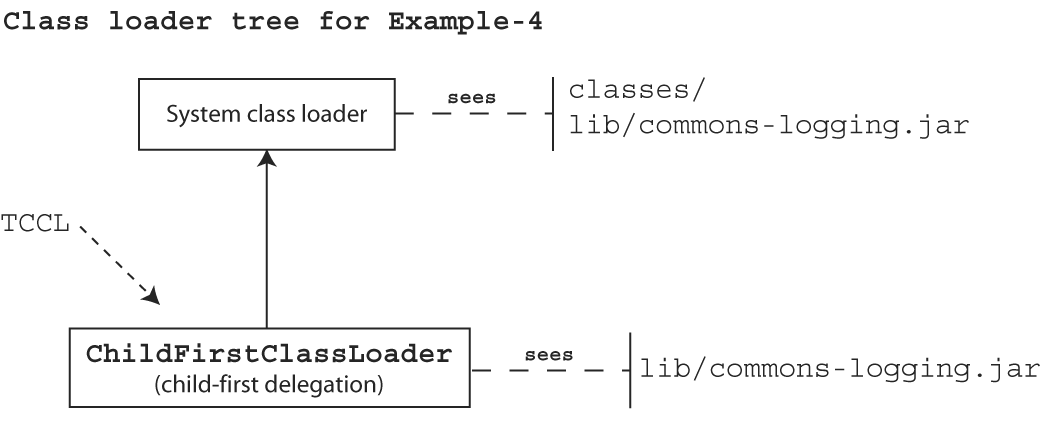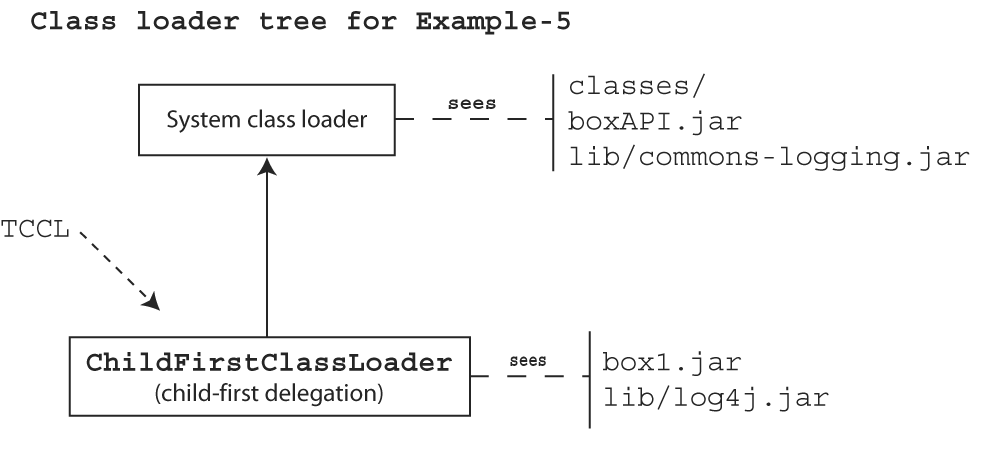Acknowledgments
I would like to thank Jacob Kjome for reviewing early drafts of this document. His comments helped to clarify several important points. Jake also keeps reminding us on the log4j-dev mailing list that the child-parent delegation model is not the only model out there and that parent-first delegation model is alive and well. Niclas Hedhman and Yoav Shapira have also made very valuable suggestions. Scott Deboy, Paul Delano, Robert Burrell Donkin, Frank-Olaf Lohmann, Dugald Morrow, Nain Hwu, Toni Price, Peter Royal, Richard Lawrence and Henning Schmiedehausen have kindly pointed out errors of typographical and grammatical nature.
Reporting errors
I've tried to make this document error-free; however I will gladly offer a copy of "The complete log4j manual" to the initial reporter of any error, be it technical, typographical or otherwise. You are highly encouraged to send your comments or critical reviews to c e k i @ q o s . c h.
If you are not interested in JCL's bugs but are looking for a quick solution for a current problem, you can skip to the section entitled Short term solutions.
JCL version
This article was tested with Jakarta Commons Logging version 1.0.4. Several proposals were put forth to correct the problems in JCL's discovery code. However, there hasn't been any tangible progress so far.
Introduction
This document attempts to systematically categorize the types of problems encountered when using Jakarta Commons Logging, hereafter abbreviated as JCL. After reading Richard Sitze's analysis about class loader problems with the JCL discovery mechanism, it occurred to me that while most people agreed JCL's dynamic discovery mechanism was problematic, it was not always easy to get a grasp around them. Hopefully, the sample code accompanying this document will allow the reader to easily reproduce at least the basic bugs. As Donald Knuth once noted, we all learn best the things that we have discovered ourselves. I hope that readily reproducing JCL's error conditions will pave the way for a better understanding of the problem domain by a wide public.
For the convenience of the reader, all source code as well as class and jar files that are needed to run the examples in this document are bundled within a single file named cl-problems.zip.
If you have the time, I suggest that you take the afternoon to go through the examples hands on. It's impossible to get a feeling for this topic just by reading the article.
It is assumed that the reader has a basic understanding of how Java class loaders work. To refresh your memory, I recommend reading the following articles.
Types of problems
Class loading problems encountered when using JCL fall into three main categories:
- Type-I: A
java.lang.NoClassDefFoundErrorthrown when a class is inaccessible from a parent class loader even if the said class is available to a child class loader - Type-II: Assignment incompatibility of two classes loaded by distinct class loaders, even in case where the two classes are bit-wise identical.
- Type-III: Holding references to a given class loader will prevent the resources loaded by that class loader from being garbage collected.
At least on a superficial level, Type-I problems are relatively easy to understand whereas Type-II problems are a bit harder to grasp at first glance. Consequently, we will start by illustrating problems of Type-I. Given their different nature, Type-III problems will be discussed only briefly towards the end of this document.
Class loader trees
Parent-first delegation model
As you probably know, a class loader usually has a reference to its parent. It follows that class loaders can be arranged into trees of class loaders. In order to retrieve a resource, a class loader will normally delegate to its parent first. The javadoc documentation of the Classloader class states:
The ClassLoader class uses a delegation model to search for classes and resources. Each instance of ClassLoader has an associated parent class loader. When called upon to find a class or resource, a ClassLoader instance will delegate the search for the class or resource to its parent class loader before attempting to find the class or resource itself. The virtual machine's built-in class loader, called the bootstrap class loader, does not itself have a parent but may serve as the parent of a ClassLoader instance.
Thus, parent-first delegation is the default and recommended delegation model in Java.
Child-first delegation model
However, under certain circumstances, a child class loader may prefer to first attempt to load resources on its own, and only later to delegate to its parent. We refer to this kind of class loaders as following the child-first delegation model. The Java Servlet Specification Version 2.4 states the following:
SRV.9.7.2 Web Application Classloader
The classloader that a container uses to load a servlet in a WAR must allow the developer to load any resources contained in library JARs within the WAR following normal J2SE semantics using getResource. It must not allow the WAR to override J2SE or Java servlet API classes. It is further recommended that the loader not allow servlets in the WAR access to the web container's implementation classes. It is recommended also that the application class loader be implemented so that classes and resources packaged within the WAR are loaded in preference to classes and resources residing in container-wide library JARs.
Note that the Servlet Specification only recommends child-first delegation order. In practice, not all Servlet Containers implement the child-first delegation model. Both delegation models are fairly common in practice.
Simple class loader implementations for both models
In order to write small test cases reproducing class loader problems, we need one class loader implementation for the parent-first delegation model and another implementation for the child-first model. Fortunately, a class loader for the parent-first delegation model is readily available. Not only does java.net.URLClassLoader implement the parent-first model, it is also very convenient to use.
As far as I know, there is no class loader implementing the child-first model that ships with the JDK. However, it does not take much to write our own.
/** * An almost trivial no fuss implementation of a class loader * following the child-first delegation model. * * @author Ceki Gülcü */ public class ChildFirstClassLoader extends URLClassLoader { public ChildFirstClassLoader(URL[] urls) { super(urls); } public ChildFirstClassLoader(URL[] urls, ClassLoader parent) { super(urls, parent); } public void addURL(URL url) { super.addURL(url); } public Class loadClass(String name) throws ClassNotFoundException { return loadClass(name, false); } /** * We override the parent-first behavior established by * java.lang.Classloader. * * The implementation is surprisingly straightforward. */ protected Class loadClass(String name, boolean resolve) throws ClassNotFoundException { // First, check if the class has already been loaded Class c = findLoadedClass(name); // if not loaded, search the local (child) resources if (c == null) { try { c = findClass(name); } catch(ClassNotFoundException cnfe) { // ignore } } // if we could not find it, delegate to parent // Note that we don't attempt to catch any ClassNotFoundException if (c == null) { if (getParent() != null) { c = getParent().loadClass(name); } else { c = getSystemClassLoader().loadClass(name); } } if (resolve) { resolveClass(c); } return c; } }
In a nutshell, ChildFirstClassLoader extends java.net.URLClassLoader and overrides its loadClass() method so that parent delegation occurs only after an unsuccessful attempt to load a class locally.
Now that we have the class loader implementations, we also need one or two classes to load and play with. We will play with various versions of the Box interface shown next.
package box; /* * Box is a small two method interface. We don't really care about * what implementations of the Box interface do, as long as they * implement its two methods. * * @author Ceki Gülcü */ public interface Box { /** * Returns the version number of the implementing class. */ public int get(); /** * Perform some operation. We don't really care what it is. */ public void doOp(); }
Here is a quasi-trivial implementation of Box.
package box; /** * A no brainer implementation of Box returning a number. This * number is set at compilation time by Ant. * * @author Ceki Gülcü */ public class BoxImpl implements Box { /** * Create an instance of BoxImpl and print it. */ static public void main(String[] args) { Box box = new BoxImpl(); System.out.println("BoxImpl version is "+box.get()); } /** * The appropriate Ant task replaces @V@ with an integer constant. */ public int get() { return @V@; } /** * Print this instance as a string. */ public void doOp() { System.out.println(this); } /** * Returns this instance's string representation. */ public String toString() { return "BoxImpl("+get()+")"; } }
In the accompanying distribution to this document, you will find 3 jar files. The file boxAPI.jar includes Box.class and nothing else. The file box0.jar includes a version of the class BoxImpl which returns zero (0) in its get() method. The filebox1.jar includes a version of the class BoxImpl which returns one (1) in its get() method.
Executing the command
java -cp boxAPI.jar;box0.jar box.BoxImpl
yields
Box version is 0
Whereas executing the command
java -cp boxAPI.jar;box1.jar box.BoxImpl
yields
Box version is 1
This shows that the jar files box0.jar and box1.jar contain implementations marked with different version numbers.
The java applications ChildFirstTest and ParentFirstTest included in the distribution demonstrate that ChildFirstClassLoader andURLClassLoader respectively implement the child-first and parent-first delegation mechanisms.
They can be run as follows:
java -cp classes;boxAPI.jar;box0.jar ch.qos.test.ChildFirstTest
and respectively as
java -cp classes;boxAPI.jar;box0.jar ch.qos.test.ParentFirstTest
JCL in parent-first class loader trees
In parent-first class loader trees JCL suffers from problems of Type-I. To understand the causes, several facts must be carefully reviewed.
JCL relies on dynamic discovery to determine the user's preferred logging API. In theory, log4j, java.util.logging and Avalon logkit are supported. In order to locate classes and resources, JCL's discovery mechanism relies exclusively on the thread context class loader which is by definition the class loader returned by the getContextClassLoader() method for the current thread. As long as the thread context class loader (TCCL) is not explicitly defined, it defaults to the system class loader, that is the class loader used to load the application.
In the following three examples, the system class loader will have access to boxAPI.jar, commons-logging.jar and the classes/directory. An instance of URLClassLoader (parent-first delegation), will have the system class loader as its parent. It will also have access to box1.jar, commons-logging.jar and log4j.jar.
Example-1
This first example, ParentFirstTestJCL0, will not explicitly set the TCCL. Thus, the TCCL will default to the system class loader.Please note that this example does not illustrate a bug in JCL but rather serves as a warm up for the rest of the examples.
public class ParentFirstTestJCL0 {
public static void main(String[] args) throws Exception {
URLClassLoader childClassLoader =
new URLClassLoader(
new URL[] {
new URL("file:box1.jar"),
new URL("file:lib/commons-logging.jar"),
new URL("file:lib/log4j.jar")
});
Log log = LogFactory.getLog("logger.name.not.important.here");
log.info("a message");
Class boxClass = childClassLoader.loadClass("box.BoxImplWithJCL");
Box box = (Box) boxClass.newInstance();
System.out.println(box);
box.doOp();
}
}
The ParentFirstTestJCL0 application creates a child class loader of type URLClassLoader and adds box1.jar, commons-logging.jar andlog4j.jar to it. In the next two lines, a JCL Log instance is retrieved by LogFactory and used to log a message. The child class loader is then used to create an instance of box.BoxImplWithJCL. We then call the doOp method of the newly created BoxImplWithJCLinstance. The doOp() method in BoxImplWithJCL invokes the LogFactory.getLog method to retrieve a Log instance and then uses it to log a simple message.
The next diagram illustrates this configuration more graphically.
Running the command:
java -cp boxAPI.jar;classes;lib/commons-logging.jar ch.qos.test.ParentFirstTestJCL0
yields
Feb 6, 2005 3:44:45 PM ch.qos.test.ParentFirstTestJCL0 main INFO: a message Feb 6, 2005 3:44:45 PM box.BoxImplWithJCL doOp INFO: hello
Wait a minute, that is output from java.util.logging, not log4j! How did that happen?
Although we could load box.BoxImplWithJCL using the child class loader (only it had access to box1.jar), JCL ignored log4j.jar in the child class loader because the thread context class loader was not set. JCL then discovered java.util.logging which provides a default configuration directing messages of level INFO and above to the console.
In the next example, we will explicitly set the thread context class loader (TCCL) and subsequently run into a whole new set of problems.
Example-2
The ParentFirstTestJCL1 application is similar to ParentFirstTestJCL0 except that it explicitly sets the child class loader as the TCCL. It then loads a new instance of BoxImplWithJCL and attempts to invoke the doOp method on that instance.
package ch.qos;
public class ParentFirstTestJCL1 {
public static void main(String[] args) throws Exception {
URLClassLoader childClassLoader = new URLClassLoader(new URL[] {
new URL("file:box1.jar"),
new URL("file:lib/commons-logging.jar"),
new URL("file:lib/log4j.jar")});
Thread.currentThread().setContextClassLoader(childClassLoader);
Class boxClass = childClassLoader.loadClass("box.BoxImplWithJCL");
Box box = (Box) boxClass.newInstance();
box.doOp();
}
}
The class loader configuration for Example-2 is illustrated in the figure below.
Running the following command
java -cp boxAPI.jar;classes;lib/commons-logging.jar ch.qos.test.ParentFirstTestJCL1
yields:
Exception in thread "main" org.apache.commons.logging.LogConfigurationException:
org.apache.commons.logging.LogConfigurationException:
No suitable Log constructor [Ljava.lang.Class;@12b66 for org.apache.commons.logging.impl.Log4JLogger
Caused by java.lang.NoClassDefFoundError: org/apache/log4j/Category)
Caused by org .apache.commons.logging.LogConfigurationException:
No suitable Log constructor [Ljava.lang.Class;@12b6651 for org.apache.commons.logging.impl.Log4JLogger
(Caused by java.lang.NoClassDefFoundError: org/apache/log4j/Category))
at org.apache.commons.logging.impl.LogFactoryImpl.newInstance(LogFactoryImpl.java:543)
at org.apache.commons.logging.impl.LogFactoryImpl.getInstance(LogFactoryImpl.java:235)
at org.apache.commons.logging.LogFactory.getLog(LogFactory.java:370)
at box.BoxImplWithJCL.doOp(BoxImplWithJCL.java:23)
at ch.qos.test.ParentFirstTestJCL1.main(ParentFirstTestJCL1.java:44)
Caused by: org.apache.commons.logging.LogConfigurationException:
No suitable Log constructor [Ljava.lang.Class;@12b6651 for org.apache.commons.logging.impl.Log4J
Logger (Caused by java.lang.NoClassDefFoundError: org/apache/log4j/Category)
at org.apache.commons.logging.impl.LogFactoryImpl.getLogConstructor(LogFactoryImpl.java:413)
at org.apache.commons.logging.impl.LogFactoryImpl.newInstance(LogFactoryImpl.java:529)
... 4 more
Caused by: java.lang.NoClassDefFoundError: org/apache/log4j/Category
at java.lang.Class.getDeclaredConstructors0(Native Method)
at java.lang.Class.privateGetDeclaredConstructors(Class.java:1590)
at java.lang.Class.getConstructor0(Class.java:1762)
at java.lang.Class.getConstructor(Class.java:1002)
at org.apache.commons.logging.impl.LogFactoryImpl.getLogConstructor(LogFactoryImpl.java:410)
... 5 more
What went wrong?
The LogConfigurationException is thrown when we attempt to log from the doOp() method in box.BoxImplWithJCL. The BoxImplWithJCL class is loaded and instantiated by the child class loader. The child class loader delegates the loading of the LogFactory class to its parent. In order to return a Log instance, at some point LogFactory invokes its getLogConstructor() method. TheLogConfigurationException is thrown from within this method.
On line 368 of LogFactoryImpl.java, getLogConstructor() invokes getLogClassName(). Given that the classes org.apache.log4j.Logger andorg.apache.commons.logging.impl.Log4JLogger are visible through the TCCL (defined to be the child class loader), the getLogClassName()method returns the string value "org.apache.commons.logging.impl.Log4JLogger". On lines 373 through 398, the Log4jLogger class is loaded into memory by the parent class loader. The TCCL, i.e. the child class loader in this example, delegates to its parent, the system class loader, which is able to find JCL's Log4jLogger class. This copy of Log4jLogger is compared against a copy of theorg.apache.commons.logging.Log class which was also loaded by the same class loader. The comparison succeeds and we proceed to the next step.
JCL loads logging API implementation classes using the TCCL but hands down the work of obtaining the constructor method to the current class loader. This discrepancy is at the heart of JCL's class loader problems of Type-I.
On line 410, the Class.getConstructor() method is invoked on the Log4jLogger class -- loaded by the parent class loader. This in turn triggers the loading of log4j's Logger class. This is done using the class loader that loaded the Log4jLogger class, i.e. the parent class loader, which cannot see log4j.jar, hence the root java.lang.NoClassDefFoundErrorexception about org.apache.log4j.Category being undefined. In other words, JCL loads logging API implementation classes using the TCCL but hands down the work of obtaining the constructor method for the implementation class to the current class loader. This discrepancy is at the heart of JCL's class loader problems of Type-I.
Example-2B: Excluding Log4jLogger from commons-logging.jar
The file commons-logging-api.jar which ships with the JCL distribution is identical tocommons-logging.jar except that the former does not include theorg.apache.commons.logging.impl.Log4JLogger and org.apache.commons.logging.impl.AvalonLoggerclasses.
Interestingly enough running ParentFirstTestJCL1 with commons-logging-api.jar on the class path gives better results. The class loader configuration for Example-2B is illustrated in the figure below.
Running ParentFirstTestJCL1 with commons-logging-api.jar on the class path as:
java -cp boxAPI.jar;classes;lib/commons-logging-api.jar ch.qos.test.ParentFirstTestJCL1
will load log4j classes without errors. Indeed, the Log4JLogger class will be loaded by the child class loader instead of the parent which cannot see Log4JLogger. The child class loader will also be able to load log4j classes.
Unfortunately, this approach has the obvious inconvenience of preventing the use of of log4j (or any other API residing outside the JDK) by classes loaded by the parent class loader, even if log4j classes are visible to the parent class loader.
Placing commons-logging-api.jar in the parent class loader is safe but precludes the use of log4j by classes directly loaded by the parent class loader. We will come back to this point when discussing child-first class loader trees. As shown in Example-2, placing commons-logging.jar in the parent class loader is unsafe when log4j classes are visible to a child class loader, also defined to be the TCCL.
In simple English, JCL's discovery mechanism can safely bridge only for java.util.logging, other logging APIs residing outside the JDK cannot be discovered in a safe manner in most configurations.
Example-3
The ParentFirstTestJCL2 application is very similar to ParentFirstTestJCL1. It illustrates that logging through JCL will fail as soon as the thread context class loader is set to the child class loader.
package ch.qos;
public static void main(String[] args) throws Exception {
URLClassLoader childClassLoader =
new URLClassLoader(
new URL[] {
new URL("file:box1.jar"),
new URL("file:lib/commons-logging.jar"),
new URL("file:lib/log4j.jar")
});
Thread.currentThread().setContextClassLoader(childClassLoader);
// this will throw a NoClassDefFoundError exception
Log log = LogFactory.getLog("logger.name.not.important.here");
}
Running
java -cp boxAPI.jar;classes;lib/commons-logging.jar ch.qos.test.ParentFirstTestJCL2
will yield the same error message as in the previous example.
JCL in child-first class loader trees
In child-first class loader trees, JCL suffers from problems of both Type-I and Type-II. We will start this section with an example reproducing a Type-II problem.
Example-4
The next example, ChildFirstTestJCL0, demonstrates that when both a parent and child class loader have direct access to commons-logging.jar and the TCCL is set to point to the child class loader, the first call to JCL's LogFactory.getLog() method from a class directly loaded by the parent class loader will throw an exception.
package ch.qos.test; import org.apache.commons.logging.Log; import org.apache.commons.logging.LogFactory; import ch.qos.ChildFirstClassLoader; public class ChildFirstTestJCL0 { public static void main(String[] args) throws Exception { ChildFirstClassLoader child = new ChildFirstClassLoader( new URL[] { new URL("file:lib/commons-logging.jar") }); Thread.currentThread().setContextClassLoader(child); // JCL will throw an exception as soon as LogFactory is called after the // TCCL is set to a child class loader, and both the parent and child // have direct access to commons-logging.jar Log log = LogFactory.getLog("logger.name.not.important.here"); } }
The class loader configuration for Example-4 is illustrated in the figure below.
Running application ChildFirstTestJCL0 with the following command line
java -cp classes;lib/commons-logging.jar ch.qos.test.ChildFirstTestJCL0
will result in the following exception
Exception in thread "main" org.apache.commons.logging.LogConfigurationException:
org.apache.commons.logging.LogConfigurationException:
org.apache.commons.logging.LogConfigurationException: Invalid class loader hierarchy.
You have more than one version of 'org.apache.commons.logging.Log' visible, which is not allowed.
(Caused by org.apache.commons.logging.LogConfigurationException: Invalid class loader hierarchy.
You have more than one version of 'org.apache.commons.logging.Log' visible, which is not allowed.)
(Caused by org.apache.commons.logging.LogConfigurationException:
org.apache.commons.logging.LogConfigurationException: Invalidclass loader hierarchy.
You have more than one version of 'org.apache.commons.logging.Log' visible, which is not allowed.
(Caused by org.apache.commons.logging.LogConfigurationException: Invalid class loader hierarchy.
You have more than one version of 'org.apache.commons.logging.Log' visible, which is not allowed.))
at org.apache.commons.logging.impl.LogFactoryImpl.newInstance(LogFactoryImpl.java:543)
at org.apache.commons.logging.impl.LogFactoryImpl.getInstance(LogFactoryImpl.java:235)
at org.apache.commons.logging.LogFactory.getLog(LogFactory.java:370)
at ch.qos.test.ChildFirstTestJCL0.main(ChildFirstTestJCL0.java:43)
Caused by: org.apache.commons.logging.LogConfigurationException:
org.apache.commons.logging.LogConfigurationException: Invalid class loader hierarchy.
You have more than one version of 'org.apache.commons.logging.Log' visible, which is not allowed.
(Caused by org.apache.commons.logging.LogConfigurationException: Invalid class loader hierarchy.
You have more than one version of 'org.apache.commons.logging.Log' visible, which is not allowed.)
at org.apache.commons.logging.impl.LogFactoryImpl.getLogConstructor(LogFactoryImpl.java:397)
at org.apache.commons.logging.impl.LogFactoryImpl.newInstance(LogFactoryImpl.java:529)
... 3 more
Caused by: org.apache.commons.logging.LogConfigurationException: Invalid class loader hierarchy.
You have more than one version of 'org.apache.commons.logging.Log' visible, which is not allowed.
at org.apache.commons.logging.impl.LogFactoryImpl.getLogConstructor(LogFactoryImpl.java:385)
... 4 more
The exception is thrown because the Log implementation loaded by the TCCL, i.e. the child class loader, is not the same as the Loginterface in use within LogFactory (loaded by the parent class loader). According to Section 4.3.2 of the Java Language Specification, two classes loaded by different class loaders are considered to be distinct and hence incompatible.
Example-4B
In the previous example, LogFactory and Log classes were loaded by the parent loader while its implementation was loaded by the TCCL. Example-4B demonstrates that if the TCCL follows child-first delegation, then in case the LogFactory and Log classes are loaded by the TCCL, the Log implementation will be compatible since it will be loaded by the same class loader.
package ch.qos.test; import box.Box; import ch.qos.ChildFirstClassLoader; import java.net.URL; /** * Usage: * * java -cp classes;lib/commons-logging.jar ch.qos.test.ChildFirstTestJCL1 * * @author Ceki Gülcü */ public class ChildFirstTestJCL1 { public static void main(String[] args) throws Exception { ChildFirstClassLoader child = new ChildFirstClassLoader( new URL[] { new URL("file:lib/commons-logging.jar"), new URL("file:box1.jar")}); Thread.currentThread().setContextClassLoader(child); Class boxClass = child.loadClass("box.BoxImplWithJCL"); Box box = (Box) boxClass.newInstance(); box.doOp(); } }
Running
java -cp boxAPI.jar;classes;lib/commons-logging.jar ch.qos.test.ChildFirstTestJCL1
will output a log message using java.util.logging.
Example-5
Previously in the fourth example, we have seen that having a copy of commons-logging.jar in both the parent and child class loaders will cause problems as soon as a class loaded by the parent attempts to use JCL. In this fifth example, calledChildFirstTestJCL2, we will remove commons-logging.jar from the child class loader and hand it a copy of log4j.jar instead. It demonstrates that when the parent class loader can see commons-logging.jar and the child class loader (also set to be the TCCL) can see log4j.jar, then as in the second and third examples, JCL will throw a LogConfigurationException because it will not be able to find the log4j classes.
package ch.qos.test; import java.net.URL; import box.Box; import ch.qos.ChildFirstClassLoader; /** * Usage: * * java -cp classes;boxAPI.jar;lib/commons-logging.jar ch.qos.test.ChildFirstTestJCL1 * * @author Ceki Gülcü */ public class ChildFirstTestJCL2 { public static void main(String[] args) throws Exception { ChildFirstClassLoader child = new ChildFirstClassLoader(new URL[] { new URL("file:box1.jar"), new URL("file:lib/log4j.jar") }); Thread.currentThread().setContextClassLoader(child); Class boxClass = child.loadClass("box.BoxImplWithJCL"); Box box = (Box) boxClass.newInstance(); box.doOp(); } }
The class loader configuration for Example-5 is illustrated in the figure below.
Running the command:
java -cp classes;boxAPI.jar;lib/commons-logging.jar ch.qos.test.ChildFirstTestJCL2
will cause the following exception to be thrown.
Exception in thread "main" org.apache.commons.logging.LogConfigurationException:
org.apache.commons.logging.LogConfigurationException:
No suitable Log constructor [Ljava.lang.Class;@4a5ab2 for org.apache.commons.logging.impl.Log4JLogger
(Caused by java.lang.NoClassDefFoundError: org/apache/log4j/Category)
(Caused by org.apache.commons.logging.LogConfigurationException:
No suitable Log constructor [Ljava.lang.Class;@4a5ab2 for org.apache.commons.logging.impl.Log4JLogger
(Caused by java.lang.NoClassDefFoundError: org/apache/log4j/Category))
at org.apache.commons.logging.impl.LogFactoryImpl.newInstance(LogFactoryImpl.java:543)
at org.apache.commons.logging.impl.LogFactoryImpl.getInstance(LogFactoryImpl.java:235)
at org.apache.commons.logging.LogFactory.getLog(LogFactory.java:370)
at box.BoxImplWithJCL.doOp(BoxImplWithJCL.java:23)
at ch.qos.test.ChildFirstTestJCL2.main(ChildFirstTestJCL1.java:42)
Caused by: org.apache.commons.logging.LogConfigurationException:
No suitable Log constructor [Ljava.lang.Class;@4a5ab2 for org.apache.commons.logging.impl.Log4JLogger
(Caused by java.lang.NoClassDefFoundError: org/apache/log4j/Category)
at org.apache.commons.logging.impl.LogFactoryImpl.getLogConstructor(LogFactoryImpl.java:413)
at org.apache.commons.logging.impl.LogFactoryImpl.newInstance(LogFactoryImpl.java:529)
... 4 more
Caused by: java.lang.NoClassDefFoundError: org/apache/log4j/Category
at java.lang.Class.getDeclaredConstructors0(Native Method)
at java.lang.Class.privateGetDeclaredConstructors(Class.java:1590)
at java.lang.Class.getConstructor0(Class.java:1762)
at java.lang.Class.getConstructor(Class.java:1002)
at org.apache.commons.logging.impl.LogFactoryImpl.getLogConstructor(LogFactoryImpl.java:410)
... 5 more
The causes for this exception are very similar to those discussed in the second example.
Example-6
The ChildFirstTestJCL3 application is very similar to the previous example. It illustrates how logging by any class loaded by the parent class loader using JCL will fail as soon as the thread context class loader is set to the child class loader.
Example-7
Suppose you are using Tomcat and wanted to use log4j in your web-application. In Tomcat, each web-application has its own class loader following the child-first delegation model. Suppose you add log4j.jar in your web-application's war file and add commons-logging.api in Tomcat's common/lib/ directory.. Well, in that case, you'd be reenacting the set up described in Example-5 and Example-6 and you'd be getting the same exceptions.
For the sceptical about the fidelity of this simulation, the distribution accompanying this document contains a small but complete web-application called "Hello" which can reproduce the problem in Tomcat.
Holding references to class loaders
In order to track the various logging implementations and their wrappers, JCL internally manages a hash table keyed by class loader. This causes problems of Type-III. Indeed, by holding strong references to class loaders, JCL prevents application containers from garbage collecting recycled web-applications. This limitation will be addressed in JCL version 1.0.5 by replacing the regular hash table with a WeakHashTable.
Compared to static binding, e.g. SLF4J
Until recently JCL was the only solution that provided an abstraction of various logging APIs. With the benefit of hindsight, the log4j project has developed an alternative solution called "Simple Logging Facade for Java" or SLF4J in short.
SLF4J supports multiple implementations, namely, NOP, Simple, log4j, JDK 1.4 logging and logback. SLF4J distributions ship with four jar files slf4j-nop.jar, slf4j-simple.jar, slf4j-log4j12.jarand slf4j-jdk14.jar. Each of these jar files is hardwired at compile time to use just one implementation, that is NOP, Simple, log4j12 and JDK 1.4 logging, respectively. Logback distributions ship with logback-classic.jar which implements the SLF4J API natively.
Unless the slf4j-xxx.jar or logback-classic.jar file is corrupt, static linking can never cause bugs of Type-I, Type-II or Type-III for the simple reason that all API bindings are done at compile time with all the required files bundled in the slf4j-xxx.jaror logback-classic.jar file.
You can verify this for yourself with the help of BoxImplWithSLF4J and related test cases found in the distribution. In a nutshell, SLF4J will never behave unexpectedly or crash your application.
Short term solutions
Given the severity of the problems with JCL, we recommend that you consider switching to SLF4J which provides better functionality with none of the bugs. In the short term however, you can substantially alleviate some of the pain of using JCL in conjunction with log4j, if you exactly adhere to the following scenario.
In all servers,
Make sure that you are using JCL version 1.0.4 or later. Earlier versions of JCL pose problems beyond those discussed in this document.
For Tomcat 5.0.27 and later,
- Make sure you are using JCL version 1.0.4 or later. Tomcat version 5.0.x ships with an outdated version of JCL.
- Leave the file TOMCAT_HOME/bin/commons-logging-api.jar as is, i.e. do not remove it.
- Place the files commons-logging.jar and log4j.jar in the directory TOMCAT_HOME/common/lib/.
- Do not include any other copies of commons-logging.jar and log4j.jar in your web-applications' WEB-INF/lib/ directory.
- Do not set the system properties
org.apache.commons.logging.LogFactoryororg.apache.commons.logging.Log.
For Resin 2.0.x
- Make sure you are using JCL version 1.0.4 or later.
- Place the files commons-logging.jar and log4j.jar in the directory RESIN_HOME/lib/.
- Do not include any other copies of commons-logging.jar and log4j.jar in your web-applications' WEB-INF/lib/ directory.
- Do not set the system properties
org.apache.commons.logging.LogFactoryororg.apache.commons.logging.Log.
Jetty
I am happy to report that future versions of Jetty are expected to drop JCL in favor of SLF4J. However, for older versions of Jetty, the following instructions should get you going.
- Make sure you are using JCL version 1.0.4 or later.
- Place the files commons-logging.jar and log4j.jar in the directory JETTY_HOME/ext/.
- Do not include any other copies of commons-logging.jar and log4j.jar in your web-applications' WEB-INF/lib/ directory.
- Set the system property
org.apache.commons.logging.LogFactorytoorg.apache.commons.logging.impl.LogFactoryImpl. This can be accomplished by starting Jetty as follows on the command line:java -Dorg.apache.commons.logging.LogFactory=org.apache.commons.logging.impl.LogFactoryImpl -jar start.jar - Do not set the
org.apache.commons.logging.Logsystem property.
Conclusion
As demonstrated above, JCL's discovery mechanism invents new and original ways of shooting yourself in the foot. For example, with JCL you can shoot yourself in the foot while aiming at the sky. Thanks to JCL you can be hit by lightning in the middle of the desert when it's not raining. If your computing life is too dull and trouble is what you are looking for, then JCL is the way to go.
In summary, statically bound discovery provides better functionality, with none of the painful bugs associated with JCL's dynamic discovery.In order for JCL to reliably discover a logging API, this API must be located at the same level or higher in the class loader tree. Thus, in practical terms, the only logging APIsafely bridged by JCL is the java.util.logging API. When compared with a statically bound bridging mechanism, for example as implemented by SLF4J, JCL's dynamic discovery mechanism has strictly zero added value. In summary, statically bound discovery provides better functionality, with none of the painful bugs associated with JCL's dynamic discovery.
Decrypting the broader phenomenon
As many Apache components rely on JCL, many developers inside and outside Apache are fooled into thinking that using JCL is safe and innocuous. Such developers assume that since a large number of projects already use JCL, it cannot suffer from any serious bugs because such bugs would have been previously reported and presumably corrected. As Eric S. Raymond put it, "given enough eyeballs, all bugs are shallow."
There is no doubt that as the number of eyeballs increases, the probability of catching bugs increases as well. However, we implicitly equate eyeballs with users of software. Unfortunately, the vast majority of users of any given software do not look at the software they are using, at least not in a serious and meaningful way. In reality the improvement in catching bugs is only logarithmic with the number of users.
The fact that many people suffer the effects of a bug does not mean they will report it, let alone research it.
The nature of the bug also plays a crucial role in its identification. Humans are good at hunting down bugs that they can see. However, humans are not mentally equipped to identify class loader bugs which depend on factors external to the code being examined. Even an experienced and competent developer can stare at a class loader bug for hours and still not realize that it is there. It takes the precision of a JVM and a lot of patience to hunt down class loader bugs which are likely to remain elusive for the foreseeable future.
